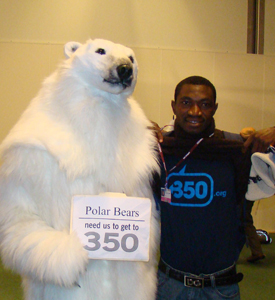|
||||||||||
|
DAY FIVE: YES, HE CAN Our white paper, press briefs, and interviews demonstrating that President Obama’s hands are not tied by Congress, and that he can negotiate a binding deal here in Copenhagen as an executive agreement, are breaking through the clamor of the conference. (Read some of the coverage.) Of course, the question of why the president would choose not to use his executive powers to cut the Gordian knot while Congress stalls and other countries use U.S. inaction as an excuse for their own really has no auspicious answer in light of the urgency of the issue.
In addition, the Center’s lifelike polar bear “Frostpaw” was a sensation when he made an appearance during dueling, real-time presentations by Interior Secretary Ken Salazar at Copenhagen and President Obama in Oslo. Hundreds of people stopped, took pictures, and listened to the bear and his assistants as he commented on our top politicians’ performances. Frostpaw asked why Secretary Salazar, cheerleading for renewable energy just a few feet away from the noble bear-on-two-legs, had just granted Shell Oil the right to start exploratory oil drilling in the pristine Chukchi Sea (adding to new drilling rights in the Beaufort Sea granted this October). He also asked why the secretary is perpetuating a Bush-era decision to take no action to protect polar bears from greenhouse gases, even though they are melting the bears’ habitat and causing them to starve and drown. Next the bear turned to a TV screen that showed President Obama accepting the Nobel Peace Prize in Oslo and asked the president to come to Copenhagen and earn that prize by saving the bear from extinction and the rest of us from a highly alarming future through a binding climate deal. The visual impact of seeing our polar bear — a/k/a legal mastermind Brendan Cummings — address the president on the most important issue affecting the world’s peace and security, at the precise moment when the president was accepting a Nobel for peace, at the very conference designed to settle the issue but already declared a failure without game-changing leadership, stopped onlookers in their tracks. (See the New York Times coverage.) Other events were less heartening. During a press conference, Todd Stern, the lead U.S. negotiator, sought to justify the U.S. use of a 2005 baseline: “There are some who favor a 1990 baseline.” Those “some” include the IPCC, the UNFCCC, and nearly all other countries at the conference. To excuse the U.S. refusal to make the deep emissions cuts necessary to avoid dangerous warming, he sought cover behind increasing emissions from developing countries. He left unmentioned those countries’ voluntary efforts to limit carbon pollution and the enormous imbalance in the ongoing per capita emissions between them (and anyone else) and the United States. He also rejected the idea of historical culpability: “We absolutely recognize our historical role in putting emissions in the atmosphere that are there now. But the sense of guilt or culpability or reparations, I categorically reject that.” To understate the matter, it is difficult to see how negotiating positions like these will advance the Copenhagen process. In the meantime, Tuvalu and the island states persist with their brave stance to buck the Kyoto Protocol’s slide into oblivion. Their request that the conference actually fulfill its promise to enter into the necessary deep emission cuts has been objected to, and the issue now is fully on the table. That alone is remarkable; there are at least six tracks of separate negotiations ongoing continuously at venues all over town, and the procedural morass appears impenetrable. Tuvalu’s breaking through it is a hopeful sign. Yet, according to a briefing given by a senior delegate from the European Union who sought to spin the impending collapse of Kyoto, it is actually much preferable to have no legally binding agreement because it would take years to implement it, while a political deal could be put to work “right away.” Moreover, it’s much better not to agree on too much right now as that would destroy the impetus to reach agreement later. George Orwell, you would be proud. Next post – Day Six: Make Some Noise for a Better Deal in Copenhagen |
| Polar bears on Hudson Bay © Brendan Cummings | HOME / DONATE NOW / SIGN UP FOR E-NETWORK / CONTACT US / PHOTO USE / PRIVACY POLICY / E-MAIL THIS PAGE |





